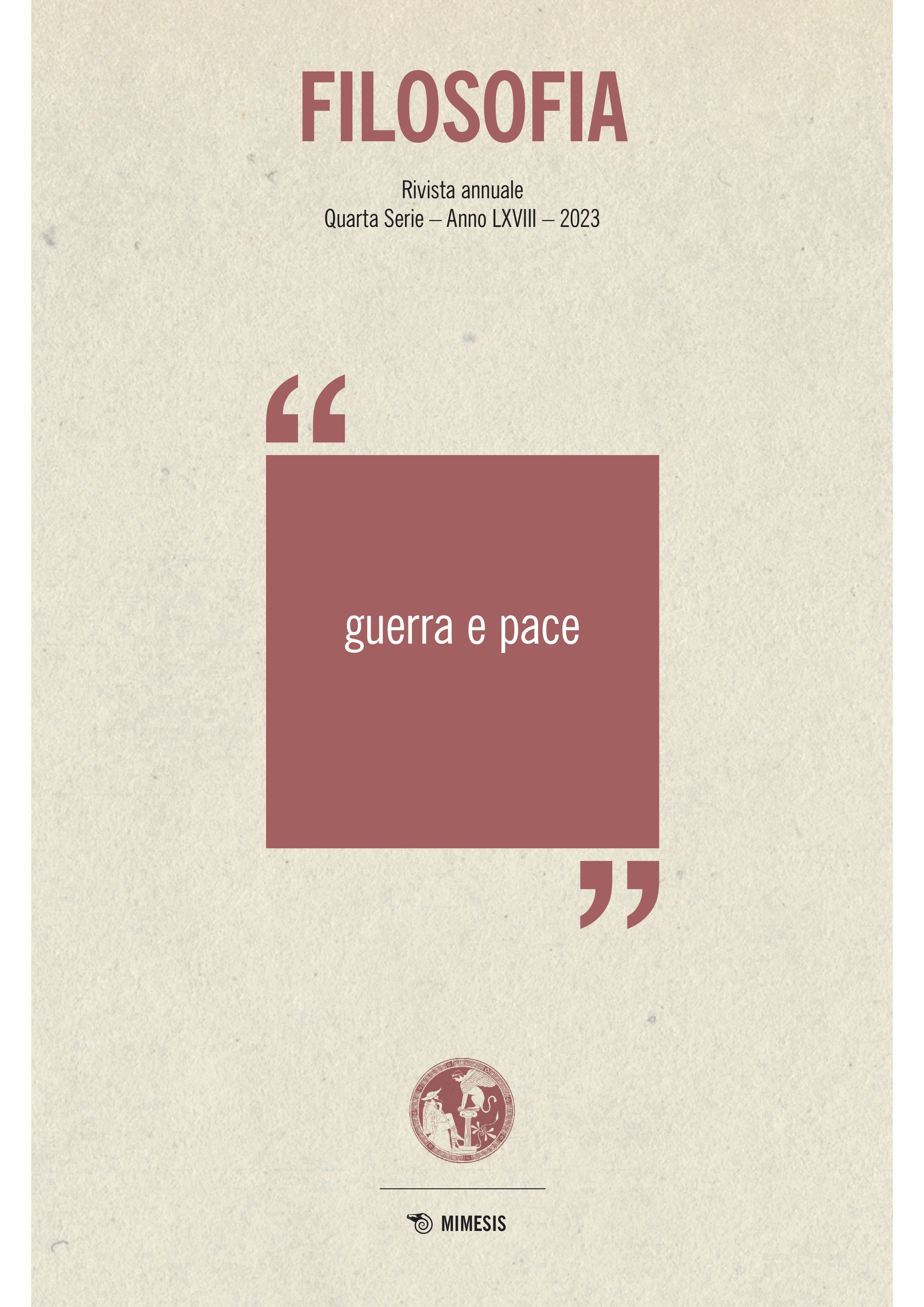Bertrand Russell: from Neo-Idealism to Mathematical Logic
DOI:
https://doi.org/10.13135/2704-8195/9219Keywords:
mathematical logic, neo-idealism, neo-positivism, notion of denoting, theory of classesAbstract
This essay is dedicated to the transition from neo-idealism to neo- positivism at Trinity College Cambridge at the beginning of 20th century. In 1903 George Edward Moore’s The Refutation of Idealism and Bertrand Russell’s The Principles of Mathematics marked the birth of mathematical logic. Especially Russell’s The Principles of Mathematics contain the theory of classes and the notion of denoting for the development of neo-positivism, then logical empiricism in the European continent. The objective of the article consists of underline the central position of neo-positivism in the twentieth-century philosophy. Indeed neo- positivism of Trinity College Cambridge has to be linked to the logical empiricism of the Vienna Circle, of the Berlin Circle and of the Lvov-Warsaw School. In that sense, the history of contemporary thought can be interpreted by the duality idealism/anti-idealism.
Downloads
References
Aristotle. 1936. Physics. Ross William David, edited by. Oxford: Clarendon Press.
Barraclough, Geoffrey. 1964. An Introduction to Contemporary History. London: Penguin Books.
Bolzano, Bernhard. 1851. Paradoxien des Unendlichen. Leipzig: C.H. Reclam.
Cantor, Georg. 1895, 1897. “Beiträge zur Begründung der transfiniten Mengenlehre”. Mathematische Annalen 46: 481-512; 49: 207-246.
Poincaré, Jules-Henri. 1900. La Valeur de la Science. Paris: Flammarion.
Poincaré, Jules-Henri. 1905. La Science et l’Hypothèse. Paris: Flammarion.
Hobsbawm, Eric. 1994. Age of extremes. The Short Twentieth Century 1914-1991. London: Michael Joseph.
Löwith, Karl. 1941. Von Hegel zu Nietzsche. Der revolutionäre Bruch im Denken des 19. Jahrhunderts. Zürich: Europa Verlag.
Moore, George Edward. 1903. “The Refutation of Idealism”. Mind 12: 433-453.
Noël, Georges. 1893. “Le mouvement et Les arguments de Zénon d’Élée”. Revue de Métaphysique et de Morale 1: 107-125.
Russell, Bertrand. 1901. “Sur la logique des relations avec des applications à la théorie des series”. Rivista di Matematica 7: 115-148.
Russell, Bertrand. 1905. “On Denoting”. Mind 14: 479-493.
Russell, Bertrand. 1906a. “On the Substitutional Theory of Classes and Relations”. Proceedings of London Mathematical Society 2: 29-53.
Russell, Bertrand. 1906b. “Les paradoxes de la logique”. Revue de Métaphysique et de Morale 14: 627-650.
Russell, Bertrand. 1908. “Mathematical Logic as based on the Theory of Types”. American Journal of Mathematics 30: 222-262.
Russell, Bertrand. 1918, 1919. “The Philosophy of Logical Atomism”. Monist, 28: 495-527; 29: 32-63, 190-222, 345-380.
Russell, Bertrand. 1921. The Analysis of Mind. London: G. Allen & Unwin.
Russell, Bertrand. 1924. “Logical Atomism” in Contemporary British Philosophy. Personal Statements, Muirhead John Henry, edited by, 357-384. London: G. Allen & Unwin.
Russell, Bertrand. 1956a. Logic and Knowledge. Essays 1901-1950, Marsh Robert Charles, edited by. London and New York: G. Allen & Unwin.
Russell, Bertrand. 1956b. “The logic of relations” in Logic and Knowledge. Essays 1901-1950, Marsh Robert Charles, edited by, 3-38. London and New York: G. Allen & Unwin.
Russell, Bertrand. 1993. “Toward the ‘Principles of Mathematics’ 1900-1902” in The Collected Papers of Bertrand Russell, Volume 3, Moore Gregory H., edited by, 181-208. London and New York: Routledge.
Russell, Bertrand. 1995. Autobiography. London and New York: Routledge.
Russell, Bertrand. 2010. The Principles of Mathematics. London and New York: Routledge Classics.
Weierstrass, Karl. 1894-1927. Mathematische Werke. 7 Bände. Herausgegeben unter Mitwirkung einer von der Königlich Preussischen Akademie der wissenschaften eingesetzten Commission. Berlin: Mayer & Müller.
Whitehead, Alfred North and Bertrand Russell. 1910, 1912, 1913. Principia Mathematica. 3 Volumes. Cambridge: University Press.
Downloads
Published
How to Cite
Issue
Section
License
Copyright (c) 2023 Caterina Genna

This work is licensed under a Creative Commons Attribution 4.0 International License.
This work is licensed under a Creative Commons Attribution 4.0 International License



